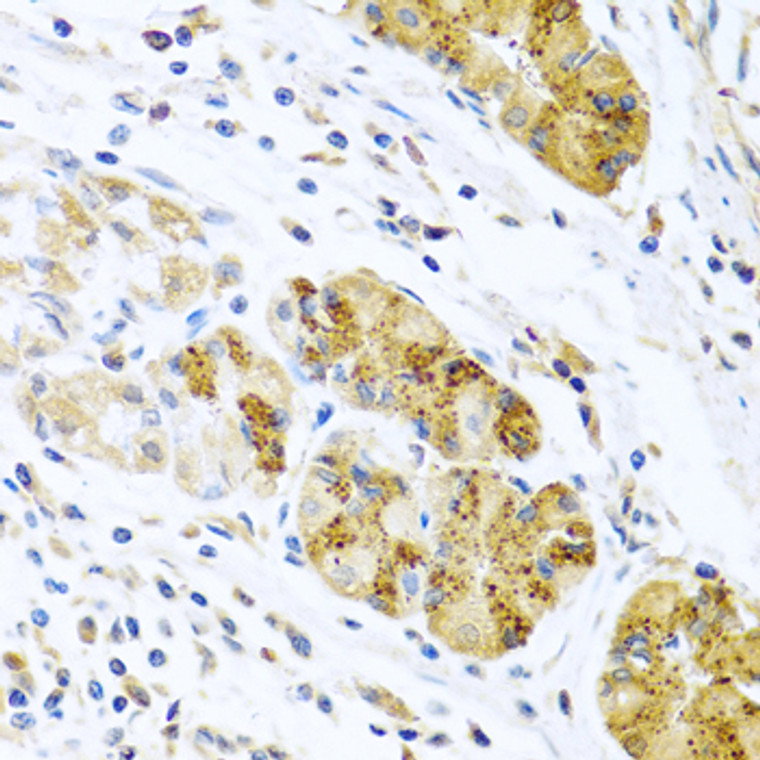| Host: |
Rabbit |
| Applications: |
IHC |
| Reactivity: |
Human/Mouse |
| Note: |
STRICTLY FOR FURTHER SCIENTIFIC RESEARCH USE ONLY (RUO). MUST NOT TO BE USED IN DIAGNOSTIC OR THERAPEUTIC APPLICATIONS. |
| Short Description: |
Rabbit polyclonal antibody anti-CCL8 (1-99) is suitable for use in Immunohistochemistry research applications. |
| Clonality: |
Polyclonal |
| Conjugation: |
Unconjugated |
| Isotype: |
IgG |
| Formulation: |
PBS with 0.01% Thimerosal, 50% Glycerol, pH7.3. |
| Purification: |
Affinity purification |
| Dilution Range: |
IHC-P 1:50-1:100 |
| Storage Instruction: |
Store at-20°C for up to 1 year from the date of receipt, and avoid repeat freeze-thaw cycles. |
| Gene Symbol: |
CCL8 |
| Gene ID: |
6355 |
| Uniprot ID: |
CCL8_HUMAN |
| Immunogen Region: |
1-99 |
| Immunogen: |
A synthetic peptide corresponding to a sequence within amino acids 1-99 of human CCL8 (NP_005614.2). |
| Immunogen Sequence: |
MKVSAALLCLLLMAATFSPQ GLAQPDSVSIPITCCFNVIN RKIPIQRLESYTRITNIQCP KEAVIFKTKRGKEVCADPKE RWVRDSMKHLDQIFQNLKP |
| Tissue Specificity | Highest expression found in the small intestine and peripheral blood cells. Intermediate levels seen in the heart, placenta, lung, skeletal muscle, thymus, colon, ovary, spinal cord and pancreas. Low levels seen in the brain, liver, spleen and prostate. |
| Post Translational Modifications | N-terminal processed form MCP-2(6-76) is produced by proteolytic cleavage after secretion from peripheral blood monocytes. |
| Function | Chemotactic factor that attracts monocytes, lymphocytes, basophils and eosinophils. May play a role in neoplasia and inflammatory host responses. This protein can bind heparin. The processed form MCP-2(6-76) does not show monocyte chemotactic activity, but inhibits the chemotactic effect most predominantly of CCL7, and also of CCL2 and CCL5 and CCL8. |
| Protein Name | C-C Motif Chemokine 8Hc14Monocyte Chemoattractant Protein 2Monocyte Chemotactic Protein 2Mcp-2Small-Inducible Cytokine A8 Cleaved Into - Mcp-2(6-76 |
| Cellular Localisation | Secreted |
| Alternative Antibody Names | Anti-C-C Motif Chemokine 8 antibodyAnti-Hc14 antibodyAnti-Monocyte Chemoattractant Protein 2 antibodyAnti-Monocyte Chemotactic Protein 2 antibodyAnti-Mcp-2 antibodyAnti-Small-Inducible Cytokine A8 Cleaved Into - Mcp-2(6-76 antibodyAnti-CCL8 antibodyAnti-MCP2 antibodyAnti-SCYA10 antibodyAnti-SCYA8 antibody |
Information sourced from Uniprot.org
12 months for antibodies. 6 months for ELISA Kits. Please see website T&Cs for further guidance









